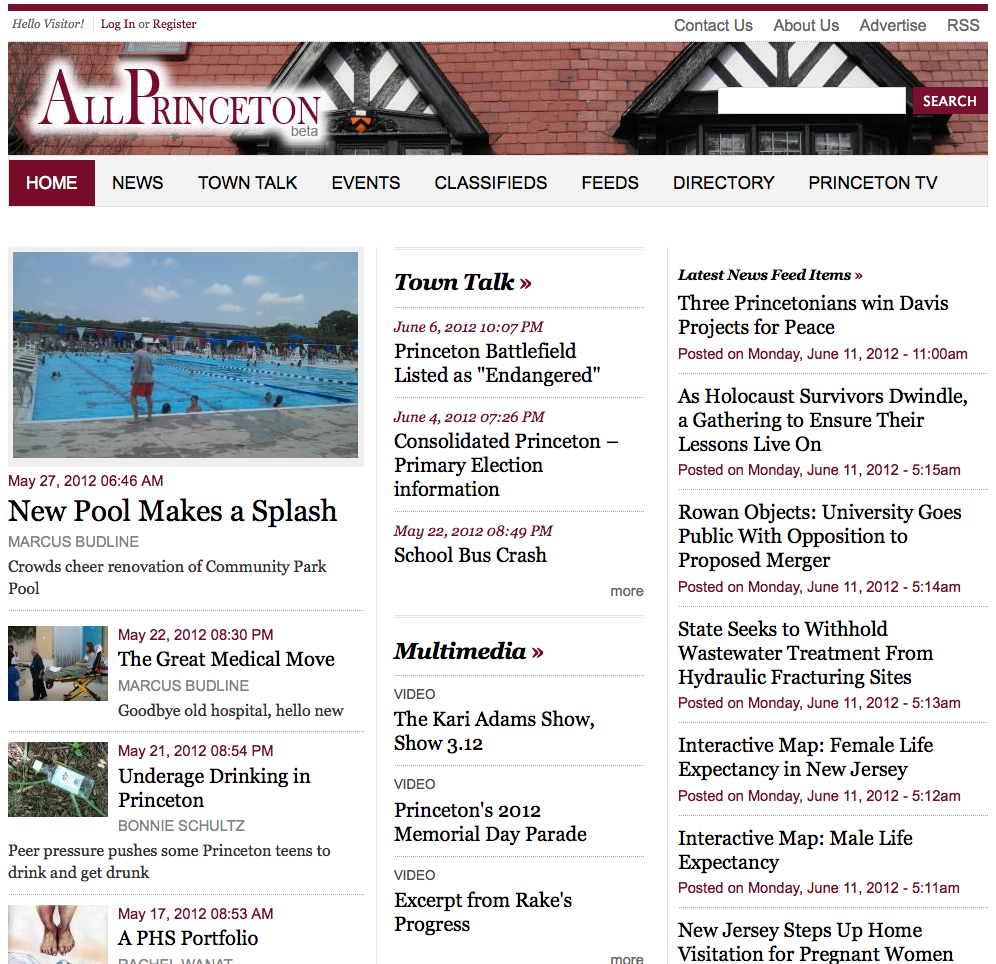By Donna Liu
Founder, AllPrinceton.com
In the two years since the All Princeton website (AllPrinceton.com) went live, it has become a stable platform for community news and input and has become a useful teaching tool for local journalism students. However, it has fallen short of  being the engaging forum it was originally meant to be and has not yet achieved sustainability.
being the engaging forum it was originally meant to be and has not yet achieved sustainability.
With hindsight I can see why things have turned out this way, although not all those reasons were so clear at the outset.
Community News Platform
All Princeton provides general information for the people of Princeton, N.J., based on a mix of reported articles, user-generated entries and algorithmically aggregated content. The combination ensures a constantly updated collection of articles and events relevant to the life of Princeton.
The mix of content has not really broken any new ground, however, as far as finding innovative sources of reporting. There is not much user-submitted content, even after holding regularly scheduled workshops at the public library, and individual sessions for certain designated bloggers and writers.
I see two main reasons for the anemic participation:
- The Drupal platform is too complicated. With hindsight I would advise anyone who launches a hyperlocal site to choose a simpler blogging software. Although All Princeton was launched fairly quickly in Open Publish, an open-source Drupal platform designed for news websites, the platform proved to be quite complex, requiring the skills of an experienced developer not only to customize it but also to maintain it. Open Publish held the promise of a turnkey solution for the kind of mixed content we offer, plus easy integration with ad modules. It was neither turnkey nor easy, and several potential contributors just gave up.
- Convincing people to write for publication, even on subjects they are passionate about, is harder than I had anticipated. For one thing, there is an explosion of websites asking good writers to participate, and I sense a kind of public fatigue on the subject of “engagement.” Secondly, I now believe that citizen journalism can only work if the organizer is also a community activist, and that requires a certain personality and set of skills that not all journalists possess.
Teaching Tool
All Princeton’s greatest promise, and possibly its most useful function to the community, is as a vehicle for the younger generation to get hands-on journalism experience. Through partnerships with Princeton University and the local high school, we had enthusiastic reporters who really appreciated how much their curiosity improved their understanding of where they live.
Training workshops were held on two levels:
- Basic journalism training for reporting and writing.
- Multimedia workshops in collaboration with both Princeton TV – the local community access station and our fiscal sponsor – and Princeton University’s Journalism Program.
It is the teaching component that differentiates All Princeton from other local news operations: by giving the community access – not just to a platform but also to the skills – we got back some original reporting. There is, however, a certain transience associated with a student workforce.
Engaging Forum
All Princeton failed to engage the community in an open discussion of public affairs. Part of the problem, as with user-generated content, was a very buggy publishing platform. Another roadblock is the fact that genuine comments can drown in the incredible amount of spam that floods the comment feature.
I also think we are up against an old-fashioned culture, which still sends letters to the editor but does not post online. I wish All Princeton could have influenced a cultural shift, but it may require more proselytizing than I could handle.
Sustainability
At the end of two years, All Princeton still does not have a sustainable business model. The Digital Media Bootcamp held at Princeton University was a source of some income and will be again this year – enough to sustain a modest level of paid activity. But advertising faltered, first because of a dead-end relationship with the now-defunct GrowthSpur, and then because of the lack of any expertise in – or time for – marketing or sales.
Shortly after All Princeton launched, several competing news sites also started up in Princeton, including a Patch site and some pure aggregators. Combined those with the websites of several existing local newspapers, and local merchants began to complain that too many people were after them to advertise. There is no shortage of platforms to choose from, but the audience for any of them is quite fragmented.
My own need for steady income eventually compelled me to trade in my volunteer time on All Princeton for a full-time job elsewhere, thus making it difficult to do much more than maintain the site at the current level of activity.
Looking ahead
I think the future of All Princeton lies more in the direction of empowering students than it does in engaging the public, although in the best of all worlds, one would lead to the other. Education will be my focus for the coming summer of internships, and another Digital Media Bootcamp at the university in the fall. If we can provide to the community at least as much awareness and access as our partner, Princeton TV, has done in the field of video, that will be a measure of success.



